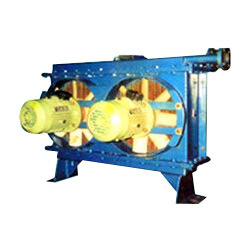Difference between revisions of "Air Blast Coolers"
Jump to navigation
Jump to search
| (7 intermediate revisions by the same user not shown) | |||
| Line 1: | Line 1: | ||
[[Category:Cooling]]{{Knoppen}} | |||
<noinclude><!------------------------------------------------ | |||
* READ THIS FIRST | |||
* Only edit this page if you can improve the content. | |||
* Improper use of this page will lead to permanent banning. | |||
* Please do not edit the sponsored link on the top right corner. | |||
* Please start editing this page after the /noinclude | |||
* -------------------------------------------------></noinclude> | |||
[[File:Air-blast coolers.jpg|thumb|right|Air Blast Coolers]] | |||
'''Air Blast Cooler''' sometimes known as [[Dry Coolers]], these are ideally suited for a whole range of cooling applications where closed circuit cooling is desirable and cooling to within 3ºC of the prevailing ambient temperature is acceptable all year round. | |||
Air Blast Coolers are a practical and cost effective alternative to [[Cooling Towers]], which by law have to conform to ACOP L8. The costs of conformance are steep and include: | |||
* Chemical treatment to guard against Legionella | |||
* Water softening to prevent lime scale formation | |||
* Treatment and safe disposal of effluent resulting from routine cleaning and draining | |||
* Water losses and make up due to constant evaporation can also be a significant operational cost. | |||
==Features== | |||
* Each will be individually selected to match the load conditions and various configurations are available to meet | |||
space and noise limitations. | |||
* Single units can be provided in capacities from 5kW to 2000kW and they can be inter-connected to reach many thousands | |||
of kilowatts. | |||
* Control of the water temperature is regulated, by controlling fan speed, according to the prevailing | |||
ambient temperature. | |||
Latest revision as of 13:38, 4 August 2012
Air Blast Cooler sometimes known as Dry Coolers, these are ideally suited for a whole range of cooling applications where closed circuit cooling is desirable and cooling to within 3ºC of the prevailing ambient temperature is acceptable all year round. Air Blast Coolers are a practical and cost effective alternative to Cooling Towers, which by law have to conform to ACOP L8. The costs of conformance are steep and include:
- Chemical treatment to guard against Legionella
- Water softening to prevent lime scale formation
- Treatment and safe disposal of effluent resulting from routine cleaning and draining
- Water losses and make up due to constant evaporation can also be a significant operational cost.
Features
- Each will be individually selected to match the load conditions and various configurations are available to meet
space and noise limitations.
- Single units can be provided in capacities from 5kW to 2000kW and they can be inter-connected to reach many thousands
of kilowatts.
- Control of the water temperature is regulated, by controlling fan speed, according to the prevailing
ambient temperature.
